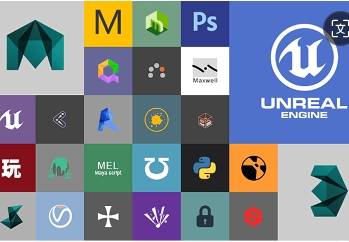Release date:2016
Duration:23 h 59 m
Author:Angus Fletcher, Ph.D.
Skill level:Beginner
Language:English
Exercise files:Not Provided
Course Overview
One of the 20th century’s greatest fiction writers, F. Scott Fitzgerald, was lured by the promise of Hollywood glamour to try his hand at screenwriting. He failed, and his misadventure became a cautionary tale for aspiring screenwriters for decades. Meanwhile, Oscar-nominated scriptwriter John Milius, who penned the script for Apocalypse Now, once said that his job was “hackwork.” So which is it? Is writing for the screen a glamorous vocation or formulaic drudgery? Is it a complex undertaking that can sink a great novelist at the height of his career, or simply another dull day job that requires minimal skill?What lies at the heart of screenwriting is the same thing that undergirds all excellent fiction writing: the story. Writing a script is another way of telling a story, albeit one with its unique possibilities and limitations. If you want to write stories—in any style or genre—the practical and versatile skills you can learn from screenwriting will enhance any tale you want to tell.
Whether you want to write your scripts or gain a deeper appreciation for the great stories you see unfold on the screen, Professor Angus Fletcher is here to show you the way in Screenwriting 101: Mastering the Art of Story. Professor Fletcher, a Professor of English and Film at The Ohio State University, brings a personal and scholarly perspective to this craft. As a screenwriter, he has experienced the ins and outs of the process first-hand. And as a key faculty member in Project Narrative, a think tank devoted to using cognitive science to study the effects of stories on the human mind, Professor Fletcher offers unique insight into storytelling from both a neuroscientific and a literary perspective. In the 24 lectures of Screenwriting 101, you will understand how to write a script and how to tell a great story that moves audiences—the ultimate goal of storytelling in any medium.
As you learn the structure and techniques of screenwriting, you will also receive an immersive education in compelling storytelling by looking at over a dozen successful film and television scripts. Whether you want to achieve the grand vision of Star Wars or challenge your audiences like Do the Right Thing, charm viewers like The Princess Bride, or sustain comedy over time like The Simpsons, Professor Fletcher shows you how to use successful scripts to write your own, as well as come to a deeper understanding and respect for wonderfulbeautiful stories.
For those just starting, understanding the reality of writing for the screen—what it can accomplish and the best methods to achieve your vision—is the first step to deciding if it is the right way to tell your story. If you have already tried your hand at screenwriting but don’t quite know how to use the form to your advantage best, the next step is to see how great scripts work and how anyone can use the tools used by screenwriters. And even if you have no intention of writing but want to see the inner workings of how great film and television work, learning the creative process is the key to genuine appreciation.
Begin at the End
A screenwriter must ask two key questions when embarking on a story: Where do I want to take my audience? How do I get there?
The question of where is about more than just physical time and place; it is the “where” of cognitive affect—the emotional and psychological response you want to elicit from your audience. This makes the “how” more complicated, as it goes beyond settings, costumes, and characters and instead goes deeper into the most fundamental processes of the human mind.
Despite what you may have been told, writing a great script is about something other than formulas and a three-act structure. Great writings and stories create the desired emotional response in audiences, which can only be achieved by knowing which methods are most effective and how they suit the level you want to tell. To uncover these methods, Professor Fletcher gives you an invaluable tool you will use in every lecture of Screenwriting 101 and your work beyond reverse engineering.
Reverse engineering a story allows you to begin at the end and work your way backward to uncover the “secrets” of the story’s influence on the audience. It is not used to locate tropes or archetypes—those are easy enough to discover without special tools—but something much more profound and fundamental. Start with the effect you want to achieve: from the tragic sublime and existential meaning to sympathy and romantic longing, the cognitive products of storytelling tap into the primal roots of the human experience and are powerful because they are universal—ask the ancient Greeks, whose storytelling techniques are one of many foundations Professor Fletcher utilizes as he shows you how structure can lead to innovation. Once you have identified the effect of a story, tracing the story structures that created it will give you limitless possibilities in your work and a greater understanding of what makes great film and television work so well.
The Elements of Storytelling
Understanding the overall cognitive effect of a story is a crucial step in creating and understanding audience response, but there are other things you must do. While there are no templates or formulas for the perfect story, there are four key elements that must work together seamlessly in every successful narrative:
Story world: The rules of your creative universe. Is your story world one where dreams come true? Where can superheroes fly? Or is it rooted in harsh reality? Genres and other pre-existing structures can give you a little help, but you must always provide the rules with your unique twist. Character: A great character can lead an audience anywhere. The main characters need to be special to stand out from everyone else, but they are all created by tapping into three essential human experiences: conflict, fear, and sympathy. Tone: Every story has a narrative voice, a lens through which the story is viewed, and determines how audiences should feel about the characters and story beats. Film and television are visual mediums, and your language as a writer is crucial to how your story will be translated to the screen. Plot: The plot is the engine that keeps your story moving forward. Humans are naturally inclined to plot, which can be a problem if you don’t know how to constrain your plots in the face of limitless possibilities. Rather than using diagrams and formulas, plotting your story beats backward can keep you on track.Study the Greats Once you grasp reverse engineering and the basic elemessentialevery story needs, you can apply your newfound knowledge to a range of compelling stories in film and television. First, you will study 12 film scripts selected by the Writer’s Guild of America as some of the greatest ever written. Then, turn to television by looking at several representative episodes and genres. Each story you encounter demonstrates a different sensibility in technique and cognitive effect.
As you study the work of over a dozen great screenwriters, you will also get fascinating glimpses into the production and ongoing influence of groundbreaking films and TV shows. Throughout the lectures, you will:
See how the right script can revive a forgotten Hollywood genre at the right time; Understand how a film that flopped on initial release can go on to become a beloved classic through the power of community; Witness the ways collaboration can shape a film throughout production and shape the story beyond the script; Discover how a script that went through nineteen rewrites ultimately rewrote film history for decades afterward; Compare the storytelling structures of television and film and see why it is essential for writers to understand the different opportunities they offer; and much more.Each story you encounter uses different tools to achieve a variety of psychological and emotional responses. Your journey through each script mirrors the pattern Professor Fletcher establishes within the first six lectures, beginning each by reverse engineering the overall story, then similarly deconstructing each of the four-story components to see how they operate as part of the whole.
From the redemption arc of the Western Unforgiven to the romantic longing of Annie Hall, each story offers invaluable insights you can bring to your writing—and viewing—experiences.
While Professor Fletcher encourages you to watch each of the stories he discusses in their final form, he forgoes video clips in favor of line readings in the lectures, adhering closely to how screenwriters work from day to day. To further immerse you in the process, the video versions of the course feature on-screen scripts with highlighting to follow each passage and scene.There is no cookie-cutter formula for writing scripts and no checklist for what makes a film or television show great. What Screenwriting 101 offers instead is an infinitely flexible storytelling tool that has worked for the greats—from Euripides to Shakespeare to Pixar—and a selection of resources to show you how to put it to use. In the end, you will have gained the invaluable ability to appreciate more films and TV, tell better stories, and write your scripts. How you decide to use these limitless creative possibilities is up to you.
01. Thinking like a Screenwriter 02. Reverse Engineering Successful Scripts 03. Building Your Story World 04. Developing Your Characters 05. Tone – The Screenwriters Lens 06. Plotting Your Story Beats 07. Sentimental Return Casablanca 08. The Tragic Sublime The Godfather 09. Romantic Satisfaction When Harry Met Sally 10. Suspense and Relief Jaws 11. Romantic Longing Annie Hall 12. Big Wonder Star Wars 13. Charm The Princess Bride 14. Alienation Effect Do The Right Thing 15. Redemption Unforgiven 16. Surreal Connection Pulp Fiction 17. Big Sympathy Toy Story 18. Existential Meaning Fargo 19. Film Versus Television MASH and MASH 20. Writing A Television Plot Game of Thrones 21. The Sitcom The Simpsons 22. The Procedural CSI 23. The Prime-Time Soap Greys Anatomy 24. Becoming a Screenwriter Screenwriting – 2126.7z [The Great Courses] Screenwriting 101 – Mastering the Art of Story by Angus Fletcher Ph.D._Subtitles.7z
audio01. Thinking like a Screenwriter.mp3 02. Reverse Engineering Successful Scripts.mp3 03. Building Your Story World.mp3 04. Developing Your Characters.mp3 05. Tone – The Screenwriters Lens.mp3 06. Plotting Your Story Beats.mp3 07. Sentimental Return Casablanca.mp3 08. The Tragic Sublime The Godfather.mp3 09. Romantic Satisfaction When Harry Met Sally.mp3 10. Suspense and Relief Jaws.mp3 11. Romantic Longing Annie Hall.mp3 12. Big Wonder Star Wars.mp3 13. Charm The Princess Bride.mp3 14. Alienation Effect Do The Right Thing.mp3 15. Redemption Unforgiven.mp3 16. Surreal Connection Pulp Fiction.mp3 17. Big Sympathy Toy Story.mp3 18. Existential Meaning Fargo.mp3 19. Film Versus Television MASH and MASH.mp3 20. Writing A Television Plot Game of Thrones.mp3 21. The Sitcom The Simpsons.mp3 22. The Procedural CSI.mp3 23. The Prime-Time Soap Greys Anatomy.mp3 24. Becoming a Screenwriter.mp3
 Channel and
Channel and  Group
Group
1、登录后,打赏30元成为VIP会员,全站资源免费获取!
2、资源默认为百度网盘链接,请用浏览器打开输入提取码不要有多余空格,如无法获取 请联系微信 yunqiaonet 补发。
3、分卷压缩包资源 需全部下载后解压第一个压缩包即可,下载过程不要强制中断 建议用winrar解压或360解压缩软件解压!
4、云桥网络平台所发布资源仅供用户自学自用,用户需以学习为目的,按需下载,严禁批量采集搬运共享资源等行为,望知悉!!!
5、云桥网络-CG数字艺术学习与资源分享平台,感谢您的赞赏与支持!平台所收取打赏费用仅作为平台服务器租赁及人员维护资金 费用不为素材本身费用,望理解知悉!



评论(0)